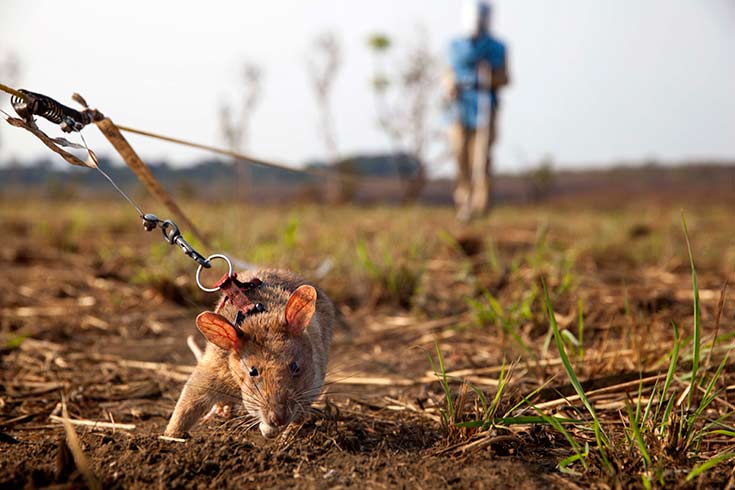Lend a leg for International landmines awareness day
Every year, The United Nations aims to raise awareness of the plight of communities living in daily fear of landmines through its International Day of Mine Awareness and Assistance in Mine action. This year, the day falls on April 4, 2016.
Each year these insidious weapons injure around 3000 people globally, mostly women and children who played no part in the original conflict, says Apopo, a Belgian non-profit organisation that trains giant pouched rats to save lives by finding landmines or detecting tuberculosis. The mines also act as a barrier to development and livelihoods, driving whole communities into poverty.

Mine clearance carried out by giant pouched rats (all photos and video courtesy Apopo)
‘Lend Your Leg’ is an international campaign that encourages people around the world to show solidarity with all survivors of landmines. Initiated by the UN in 2012, Lend Your Leg asks people to demonstrate their support by symbolically rolling up a trouser leg.
Ahead of the International Day for Mine Awareness on Monday, April 4, 2016, Apopo is challenging its supporters around the world to come out in force and show their support for survivors of landmines globally: “We want you to send us pictures of you and your friends Lending Your Leg,” says the organisation.
The best picture, judged by Apopo Founder, Bart Weetjens, will win a HeroRAT hoodie and a HeroRAT adoption.
To enter send your pictures along with your name and location to herorats@apopo.org. Apopo will upload the best images to its the best images to APOPO HeroRATs Facebook Page. You can also share your pictures on Social Media with the hashtag #LendYourLeg. "Let us know about your picture by tagging us in your posts using @HeroRAT," says Apopo.
Apopo’s goal is to get people back on their land as soon as possible. It says: “At almost three thousand, annual global landmine accidents are unacceptably tragic; 80 per cent of them involve innocent people unrelated to the original conflicts; 46 per cent of these are children.
“Every bit as tragic, yet going largely unrecognised, is the immense and negative impact posed by landmines to the development of mine-contaminated countries such as Cambodia and Angola. Vast tracts of productive land have been rendered off-limits for decades, yet only about three per cent of that land typically contains any explosive material at all. The rest sits needlessly idle, while desperate nearby communities are too afraid to use it.”
This, says Apopo, is where HeroRATs step in. Apopo specifically targets large areas near towns and villages where the existence of landmines is not certain, checking them swiftly and efficiently for explosive remnants of war.
Unlike metal detectors, the mine detection rats only detect the scent of explosives and ignore scrap metal usually lying around. The mine detector rats are up to 96 times faster at detecting landmines than a technician with a metal detector, says Apopo. Utilising a combination of HeroRATs, technicians with metal detectors and machines, Apopo can safely dispose of any landmines discovered. This novel approach reduces the cost of safely returning people to their land, leaving vital funds to address further areas.
Once declared safe, communities can immediately begin using the land for crops, grazing, or for expansion of their towns and villages.
https://youtu.be/3IxU-MZ12VE
Clearing landmines is dangerous, slow, and costly, but Apopo believes the HeroRATs are the best way to get people back on their land as quickly as possible and this is key to kick-starting their war-torn economies. To date APOPO has released over 25 million square metres of contaminated land, and destroyed over 68,000 landmines and bombs in six countries, helping over 900,000 people reclaim their lands and economic livelihoods.
APOPO rats have also identified over 8,900 tuberculosis patients missed by public clinics in Tanzania and Mozambique. This has potentially halted over 36,000 further infections, and increased detection rates by over 40 per cent in partnered clinics.